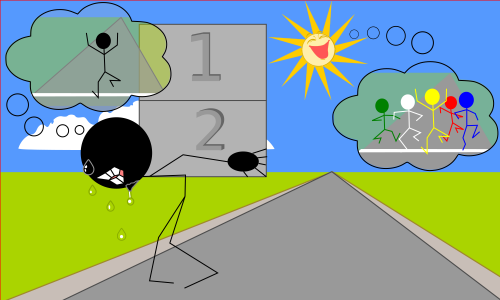
The greatest of fools is he who imposes on himself, and in his greatest concerns thinks he knows that which he has least studied, and of which he is profoundly ignorant
. Lord Shaftesbury (Anthony Ashley Cooper)
Ignorance more frequently begets confidence than does knowledge
Charles Darwin
Illusory Superiority (I have superior understanding)
Illusory superiority is where a person overestimates their own qualities and abilities in comparison to the same things in others. Research in this area reveals a strange paradox where the ignorant can be more confident is their opinions that the knowledgeable. This ‘illusion of confidence’ is also called the ‘Dunning-Kruger effect’ and describes the cognitive bias to inflate self-assessment.
This phenomenon extends into many areas of our lives. The problem is that to learn we need a proper feedback loop and in some people (if not all of us to some degree) the feedback is distorted. In other words, if you are training to win a race and peaking at 5 km/h, but your feedback tells you that you are running at 60 km/h while nobody else can get past 10 km/h, then you are bound to be dismayed when you lose.
We see the effect very pronounced in the areas of politics and sport where there is irrational confidence in opinions about the potential of teams, parties, candidates or players by those who know least about these domains of expertise. For the most part and for the average person, manifestation in those areas are of little consequence. What concerns me is what follows:
- In life, and in particular in Christianity, success and satisfaction depend on wisdom and understanding of which rules to follow and which strategies to adopt.
- People (and hence Christians) differ widely hence in some cases wisdom and understanding is sound while in others what passes for it can be imperfect at best and stubborn resistance, stupidity, incompetence, or dangerous at worst.
- Tragically, people who fall into the second category of the second point suffer a dual burden because, not only do they arrive at ridiculous or harmful conclusions but their incompetence robs them of the ability to realize it.
This is what has been proven to be true by the research of Dunning and Kruger. It is something that is painful to observe in action but can be remedied with humility. Unfortunately, humility is the last thing that people in this condition usually display. In other words will such a person admit that they do not understand and benefit from what God says?
The word translated as faults is at times translated sin. Here I believe that the translation is correct. The word is literally misses which I believe could be translated as shortcomings in the vernacular. According to this scripture a potent remedy for our shortcomings is the prayer of a righteous man. If we are already more righteous than most then we have nothing to pray about and certainly would not defer to lesser beings to pray for us.
Sometimes it may not be prudent to confess to individuals and here the Bible also provides recourse to the Father Himself.
The point is that denying the truth about ourselves makes it harder for us to reach our potential but the less we actually know the more confident we are in our stupidity. If we are not able to assess and respect the value of objective evidence against us then we are destined for big disappointment. A named concept that is a subtopic related to what has already been stated is the above-average effect. This is when a person who is not outstanding in a particular area believes that they are. Common sense says that most of us are average because otherwise, if most are not average then the normal case is to be above average, which is a logical absurdity since normal means what is common.
Philippians 2:3 [KJV] Let nothing be done through strife or vainglory; but in lowliness of mind let each esteem other better than themselves.
Acts 17:11 [KJV] These were more noble than those in Thessalonica, in that they received the word with all readiness of mind, and searched the scriptures daily, whether those things were so.
...the failure to recognize that one has performed poorly will instead leave one to assume that one has performed well. As a result, the incompetent will tend to grossly overestimate their skills and abilities.Justin Kruger, David Dunning Unskilled and Unaware of It: How Difficulties in Recognizing One's Own Incompetence Lead to Inflated Self-AssessmentsResearchGate.net WEBJanuary 2000
In the conclusion of their thesis they stated We propose that those with limited knowledge in a domain suffer a dual burden: Not only do they reach mistaken conclusions and make regrettable errors, but their incompetence robs them of the ability to realize it
.
Dunning and Kruger made four predictions before conducting their experiments:
Prediction 1. Incompetent individuals, compared with their more competent peers, will dramatically overestimate their ability and performance relative to objective criteria.
Prediction 2. Incompetent individuals will suffer from deficient metacognitive skills, in that they will be less able than their more competent peers to recognize competence when they see it—be it their own or anyone else's.
Prediction 3. Incompetent individuals will be less able than their more competent peers to gain insight into their true level of performance by means of social comparison information. In particular, because of their difficulty recognizing competence in others, incompetent individuals will be unable to use information about the choices and performances of others to form more accurate impressions of their own ability.
Prediction 4. The incompetent can gain insight about their shortcomings, but this comes (paradoxically) by making them more competent, thus providing them the metacognitive skills necessary to be able to realize that they have performed poorly.
The incompetent can improve their ability to assess their own performance and that of others, but this comes (paradoxically) by making them more competent i.e. moving them out of the incompetent class altogether, thus providing them the metacognitive skills necessary to be able to realize that they have performed poorly. This can be a real problem for at least two reasons, first, if they are unwilling to entertain the possibility that the person in the role of the teacher is actually more competent than they, and second, they accept that they need more competence in the area and are not in fact just fine where they are.
Bellows states: The British philosopher Bertrand Russell once wrote that the trouble with the world is that the stupid are cocksure and the intelligent are full of doubt. This is true whether one interprets stupid as foolish (short on smarts) or as ignorant (short on information). Deliberately or otherwise, his sentiment echoes that of Charles Darwin, who over one hundred years ago pointed out that ignorance more frequently begets confidence than does knowledge
.
Now I found it ironic that Darwin made that statement. The article goes on to say:
Certainly the Unskilled and Unaware of It research backs up the idea that when a person cannot recognize his or her own poor performance, their self-assessment does not include that negative information. This results in an artificially inflated view of ones own skills, often tempered by ego. The same effect will cause the incompetent to congratulate one another as they fail to detect one anothers inadequacies. One possible corollary to these conclusions is Scott Adams Dilbert Principle, which tells us that the most ineffective workers are systematically promoted into management. Perhaps those doing the promoting are incompetent, and therefore fail to recognize the incompetence in those they reward
.
People think that they are right.
In spite of everything that anybody says we will justify ourselves to our own destruction. We do not recognise the true difficulties of life and so we are confident that we can handle it ourselves.
James 4:14-15 KJV Whereas ye know not what shall be on the morrow. For what is your life? It is even a vapour, that appeareth for a little time, and then vanisheth away. 15 For that ye ought to say, If the Lord will, we shall live, and do this, or that.
The research also brought out an interesting related conclusion. People who are competent tend to assess others as more competent than they really are. It has been proposed that this is because they assume that others have also developed the skill that they have, not considering it particularly outstanding. In my own assessment this can lead competent people to have inflated expectations of others and to believe that they are being dishonest about their performance in specific instances. This means that a competent singer can have a novice perform with them on stage and when that person flops believe that they did it deliberately to embarrass them. At the same time the person who performed so poorly thinks themself to be outstanding and that the expert singer is overreacting.
According to Kruger and Dunning It thus appears that extremely competent individuals suffer a burden as well. Although they perform competently, they fail to realize that their proficiency is not necessarily shared by their peers
.
This drives us to one conclusion: that however smart we think that we are it would be wise to be like the Bereans who were more noble than those in Thessalonica, in that they received the word with all readiness of mind, and searched the scriptures daily, whether those things were so
, Acts 17:11 [KJV]. They received the information with an open mind, i.e. not clogged up with illusions of superiority, and checked, i.e. they were not lazy and did not just accept it for whatever reason.

